#New Life Version Holy Bible
Photo
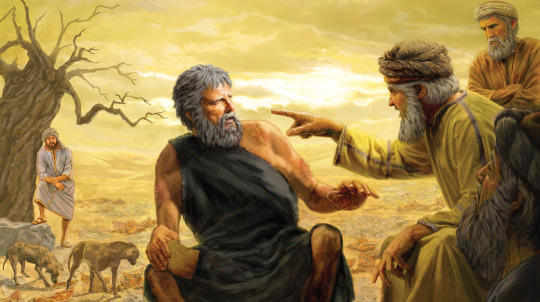
Job Speaks Angry Words to God
1 After this Job opened his mouth and cursed the day he was born. 2 He said, 3 “Let the day be lost on which I was born, and the night which said, ‘A boy is born.’ 4 May that day be darkness. May God above not care for it. May light not shine on it. 5 Let darkness and a heavy shadow take it for their own. Let a cloud come upon it. Let the darkness of the day bring fear upon it. 6 As for that night, let darkness take hold of it. Let it not have joy among the days of the year. Let it not come into the number of months. 7 Yes, let that night be alone and empty. Let no sound of joy come into it. 8 Let those curse it who curse the day, who are able to wake up the Leviathan. 9 Let the early morning stars be made dark. Let it wait for light but have none. Do not let it see the light of day. 10 Because it did not keep my mother from giving birth to me, or hide trouble from my eyes.
11 “Why did I not die at birth? Why did I not come from my mother and die? 12 Why did the knees receive me, or why the breasts, that I should have milk? 13 For now I would have lain down and been quiet. I would have slept then. I would have been at rest, 14 with kings and wise men of the earth who built cities for themselves that are now destroyed. 15 I would have been at rest with princes who had gold, who filled their houses with silver. 16 Why did I not die before I was born, hidden and put away, as babies that never see the light? 17 There the troubles of the sinful stop. There the tired are at rest. 18 Those in prison are at rest together. They do not hear the voice of the one who rules over their work. 19 The small and the great are there. And the servant is free from his owner.
20 “Why is light given to him who suffers? Why is life given to those who feel sad in their soul? 21 They wait for death, but there is none. They dig for it more than for hidden riches. 22 They are filled with much joy and are glad, when they find the grave. 23 Why is light given to a man whose way is hidden, and around whom God has built a wall? 24 For I cry inside myself in front of my food. My cries pour out like water. 25 What I was afraid of has come upon me. What filled me with fear has happened. 26 I am not at rest, and I am not quiet. I have no rest, but only trouble.”
— Job 3 | New Life Version (NLV)
New Life Version Holy Bible Copyright © 1969, 2003 by Barbour Publishing, Inc.
Cross References: Genesis 30:3; 1 Samuel 28:19; Job 2:13; Job 4:1; Job 6:7; Job 7:8; Job 9:28; Job 10:18; Job 12:17; Job 12:21; Job 21:33; Job 41:1; Job 41:18; Psalm 44:19; Psalm 58:8; Proverbs 31:6; Ecclesiastes 6:3; Lamentations 3:7; Jeremiah 8:3; Jeremiah 15:10; Jeremiah 20:17; Revelation 9:6
#Job#angry#laments#birth#JOb 3#Book of Job#Old Testament#NLV#New Life Version Holy Bible#Barbour Publishing Inc.
10 notes
·
View notes
Text

The Season 2 Poster Details
From top to bottom :)

This is a Buddy Holly song Everyday which was originally supposed to be the Good Omens theme :)
Neil talks about it in the Introduction to the Script Book: “In the scripts, Buddy Holly’s song ‘Every Day’ runs through the whole like a thread. It was something that Terry had suggested in 1991, and it was there in the edit. Our composer, David Arnold, created several different versions of ‘Every Day’ to run over the end credits. And then he sent us his Good Omens theme, and it was the Good Omens theme. Then Peter Anderson made the most remarkable animated opening credits to the Good Omens theme, and we realised that ‘Every Day’ didn’t really make any sense any longer, and, reluctantly, let it go. It’s here, though. You can hum it.”

And there is also the Buddy Holly Everyday record! :)

Book The Crow Road by Iain Banks. The novel describes Prentice McHoan's preoccupation with death, sex, his relationship with his father, unrequited love, sibling rivalry, a missing uncle, cars, alcohol and other intoxicants, and God, against the background of the Scottish landscape

Book Lord Jim by Joseph Conrad. An early and primary event in the story is the abandonment of a passenger ship in distress by its crew, including a young British seaman named Jim. He is publicly censured for this action and the novel follows his later attempts at coming to terms with himself and his past and seeking redemption and acceptance.
Important themes in Lord Jim include the consequences of a single, poor decision, the indifference of the universe, and the inability to know oneself or others.

There is book The Body Snatcher by Robert Louis Stevenson. Its characters were based on criminals in the employ of real-life surgeon Robert Knox (1791–1862) around the time of the notorious Burke and Hare murders (1828). Neil said: Oddly enough, episode 3 will take us to a little stint of body snatching in the era.

There is Catch-22 book by Joseph Heller that coined the term Catch-22: situation from which an individual cannot escape because of contradictory rules or limitations.
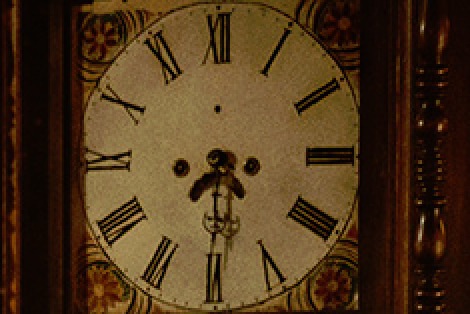
Is there only one hand or are there two? :) EIther 6 ;), or 6:30 :).

Through the window we can see the coffeeshop Give Me Coffe or Give Me Death where Nina works! :)


Azi is wearing his nifty glasses :).


Crowley is wearing his new glasses, they are RIGARDS X UMA WANG - THE STONE ECLIPSE (VINTAGE BLACK/BLACK STONES) - $435




There is the Holy Bible Aziraphale used in Season 1 :)

There seems to be a broken phone :).

The cakes behind Aziraphale are Eccles cakes :).

Azi is reading A Tale of Two Cities by Charles Dickens published in 1859, set in London and Paris before and during the French Revolution. The novel tells the story of the French Doctor Manette, his 18-year-long imprisonment in the Bastille in Paris, and his release to live in London with his daughter Lucie whom he had never met. The story is set against the conditions that led up to the French Revolution and the Reign of Terror.


Another book there is Pride and Prejudice by Jane Austen - Neil said said that we will learn a lot about Jane Austin we didn’t know before.

And finally the Treasure Island book by - again :) - Robert Louis Stevenson, an adventure novel with pirates.


There are three geckos cuties. Who are they? Pets? Is Ligur haunting the bookshop? Who knows :).

A mysterious pamphlet, 'The Resurrectionists’ leaflet. (unofficial spoiler :)).

Also there is an old camera... mmm 🤔 Did Azi made some photos (of what? Him and Crowley, ducks? :)) Will we see them? :)
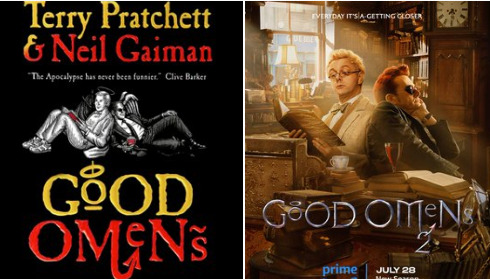
Their positions is an homage to the book covers! :)(x)
Will update this as fandom discovers new things! :)❤
#good omens#gos2#season 2#posters#s2 poster details#fun fact#robert louis stevenson#jane austen#joseph heller#charles dickens#can't waiiiit#wahoo!
6K notes
·
View notes
Text
Psalms 85:6
King James Version
Wilt thou not revive us again: that thy people may rejoice in thee?
Inspiration
Church folks love a good old fashioned revival. Guest speakers, special music, late nights, wonderful God experiences. Pastors usually call for revivals as a type of "booster shot" for the church. Revivals help to direct some much needed spiritual energy into the weary saints of God. But some revivals last for weeks, months, and years. It is in those places that God is truly reviving or "bringing back to life" dead hearts and souls. This prayer is a prayer for the believer whose soul is parched. It is a prayer of someone desperate to experience the joy of the heart. A prayer for revival is a prayer for renewal in the mind, heart and soul of the believer.
Prayer
Father, revive me. Fill my heart and soul with a new understanding of You. Where I have poured out to others in Your name, pour out to me. Let the revival in my heart spark a revival in those around me. Let it begin with me. In Jesus name. Amen.
#Light Bible#Christianity#The Holy Bible#Kjv#king james version#inspiration#prayer#devotion#holy#jesus is god#Revival#New Life#Got from a Bible App#Hope#Joy#Peace#Renewal#Heart and Soul#Booster Shot#Psalms#Scripture#Verse
0 notes
Text
Trafalgar Law and Faith
Pre-emptive warning this is going to be another LONG metapost/analysis. There’s a lot I could talk about here but for the sake of structure I’m going to split this into three sections, i.e. the main ‘faith transitions’ that Law has gone through in the narrative thus far: 1. Flevance (catalyst for loss of religious faith), 2. Corasan (martyr that figuratively and literally saves law by giving him something to live for, introducing the will of D.), and 3. Luffy (cementing faith in this new belief system and regaining trust in the goodness of humanity through the living embodiment of everything Corasan believed in).
Before we get into all that though, let’s establish that Christianity is a thing in one piece. Speedrunning through some visual examples that come to mind; the Flevance church and nun (holding a celtic cross - censored in the anime version), a nun literally praying to God right before Marineford, Vinsmoke Sora’s grave marked with a cross (is op Christianity a northern thing?), Usopp and Chopper having crucifixes and holy water whenever ghostly stuff is brought up, Kuma and his trusty bible, the religious symbols on Kikoku’s hilt (could instead be more a reference to the Red Cross/symbol of humanitarian and medical aid as a doctor) and especially in whatever Mihawk’s got going on (though this could just be a Japanese cultural thing with Christianity being a minority religion or Oda just finding that some of the iconography, y’know. looks cool). There are also many other references to other religions e.g. hinduism, shintoism, buddhism, etc. Whether op forms of religion are the same as the real-world ones is debatable, and yes, Law being canonically raised as a devout catholic schoolboy with all the religious trauma associated with that is comical, but let’s take it all unironically for a hot minute. For fun.
1. Flevance
Law’s birthplace (Flevance) is described as being, at one point, “a very wealthy country with an unearthly beauty about it, with pure white soil and plants, like some kind of snow kingdom in a fairy tale.” The country’s wealth came from the very bedrock it sits on — white lead, which could be used to make various high quality products like tableware, cosmetics, weapons etc. When the wider world heard about this everyone wanted a piece of Flevance (the World Government also getting involved with distribution), and very quickly white lead became a “bottomless well of money”. So, hooray. Law gets to grow up in a rich city in a big house with educated doctor parents and probably gets to go to private school on weekdays and festivals with his family on weekends. One problem. In their greed, the Government and royalty have been knowingly hiding the truth about this supposed goldmine from the beginning. White lead is a toxic poison. Mining it from the ground over the last century and putting it in so many everyday products has resulted in it accumulating in the citizens’ bodies and leading to amber lead sickness, shortening their life-span with each successive generation – with the children of Law’s generation fated to die out before they reach adulthood.

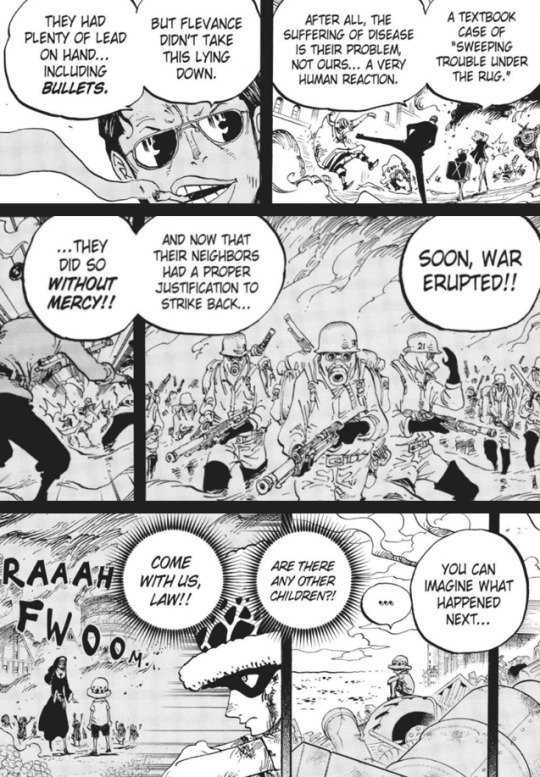
In the bible (especially in the old testament), God often inflicted these insanely disastrous events upon humanity, usually as some kind of punishment for their wrongdoings or as a test of their faith. Some events of which include (but are not limited to): famine, outbreaks of disease and natural disasters (e.g. hail, wildfire, earthquakes, floods). Historically, these stories played a key role in how humanity interpreted meaning from horrible disasters (e.g. assuming bubonic plague was sent as a punishment by god). Fire imagery is very common among these disasters as a representation for hell, which is clearly reflected in the destruction of Flevance.


Sometimes these disasters had sole survivors act as messengers for God. With that context, let’s put ourselves back in the shoes of a ten-year old Law. Raised religious, freshly traumatised from losing his home, his devout family, all the comforts of his life, and having the outside world completely abandon him, this kind of event is likely going to be processed as some form of divine punishment. Law stumbles through hell, finds all his dead classmates, and the last words of sister nun echo through to him here. Merciful and salvation are huge catholic buzzwords – promises of holy compassion, deliverance and hope – and all of it fire and smoke and riddled with bullet holes before him. A genocide funded, perpetuated and covered up by the same body Law was promised was there to save them. And the only reason Law hadn’t died with them was because he wanted to stay with his little sister Lami, who was on her deathbed, and his parents, who were themselves trying to help the afflicted citizens, Law’s own father (before he was shot and killed alongside his mother) begging for more doctors, fresh blood, anything the world can offer, and asking “Why doesn’t the government announce to everyone that white lead is not infectious?”
Oftentimes (and in the case of Law), when there’s a promise of heavenly intervention or some miracle that doesn’t follow through, it results in an ultimate feeling of betrayal and anger. Unfortunately a lot of Catholic teachings also use a lot of guilt, essentially teaching people that the bad things that happen to you are your fault and there needs to be some sort of penance (queue Law’s survivor’s guilt that carries on down the road). But also, if this was supposed to be some divine punishment, for what exactly? For the town being blinded by the incredible wealth they were sitting on? Being lied to? Continuing to extract their livelihood, ignorant of its dangers? Punishment for who? His parents? His innocent little sister? For ten year-old Law? These people who believed in God, who were good people? That’s fucking stupid. None of these people suffered and died for any reason at all — certainly not for a sacred one. God hadn’t saved a single one of them. Law had to crawl out of hell himself by sneaking over the border under a mound of corpses.
Given everything that happened here, Law has every reason to fall into nihilism, and you can see how his upbringing would’ve bred a lot of the feelings of guilt, anger and resentment that you still see in Law (which would suggest that though this is where he likely cuts ties with the religious/Catholic component of his faith, growing up with these teachings in his formative years would definitely influence underlying beliefs about how the world works, and how Law behaves and subconsciously processes information), but at the same time, there’s usually some form of redemption and changes to how these patterns of behaviour can be approached later down the line.
2. Corasan
Fresh off witnessing his whole world burning down around him, Law meets Corazon at the very bottom of this pit of self-destructive rage and unprocessed grief. Rosinante himself mentions to Sengoku that the hatred in Law at this time reminded him of his brother, but beyond the anger, harsh pessimism, vengefulness, I think you have to reach to find similarities between them. You can see some fragments of Doffy in Law down the line at times, with Law seeming to enjoy violence (especially against the navy, but given what they did to Flevance, it’s some well-deserved retribution for Law imo), but I’m not so sure it’s the cruelty so much as it is the high he gets off his own flavour of justice. Doctor’s Hippocratic oath maybe, but never once does Law like seeing others die (even at this point, he’s in tears next to a dead body, even though he’s the one holding the knife), and later on in Wano he makes it explicitly clear to Zoro that he’d rather see the mission fail than have any of them end up dead.
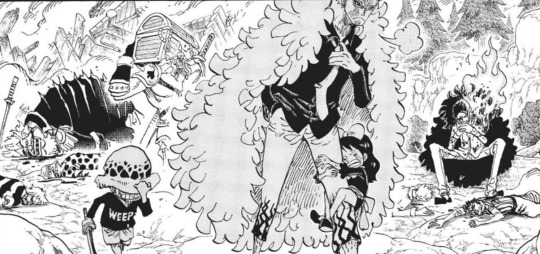
Little Law wanted to destroy the world and everything in it, but thinking rationally, what other choice did this kid have? He had no remaining family, was doomed to die before he hit puberty due to a terminal illness, was perceived as an infectious subhuman that most doctors would’ve sooner tried to exterminate than help. To Law, the world had turned its back on him – considering him a monster for simply surviving. He has all this hatred and pain boiling away with him with no tangible target to direct it towards. And this is the first clear cut rejection of faith that we see in Law. Any concept of a merciful God had just died. What God would allow this? Why is Law alive (a question that he repeats to himself throughout his life), why are these scumbags alive, why is the world going on spinning as if nothing has happened when his whole world had gone up in flames, why does anyone at all get to be here when everything I loved is gone? And it’s far easier to fall into a despondent nihilistic stupor than it is to work through any of that, and what’s the point in trying to process and move on from it, when there’s no hope for a future for Law anyway? When the only thing waiting ahead is more pain? What was this, if not a punishment? He’s supposed to be some messenger for God? How about fuck God, or whatever entity that exists that made him suffer this. Law’s not going to be a messenger for shit, thanks, he’d rather be their monster, he’d rather watch the world burn.
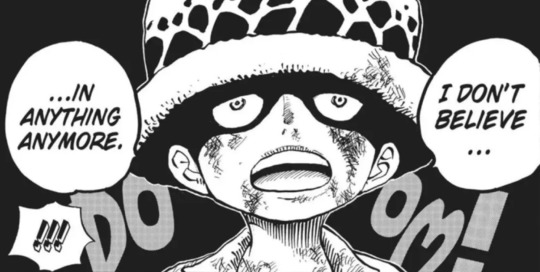

Corazon survives Law’s stabbing and doesn’t rat the little shit out (to Law’s confusion). It’s business as usual for another two years, then, one day Rosinante overhears his true name - Trafalgar “D” Water Law, and everything changes. On the back of his own beliefs, Rosinante dedicates himself to making sure Law a) lives and b) doesn’t become his brother. Law’s relatively short six month stint with Corasan forms the basis of Law’s new creed going forward, and all it took was a bit of kindness, love and humanity when the rest of the world had abandoned him. In the end Rosinante doesn’t save Law for the will of D. and the storm he’s predicted to bring in the future (as Law suspects), but he certainly believes in it, and the strength of Corasan’s conviction transfers right over to Law when he forces the ope ope fruit down the kid’s throat to heal him, tells Law he loves him, then sacrifices himself to set Law free.



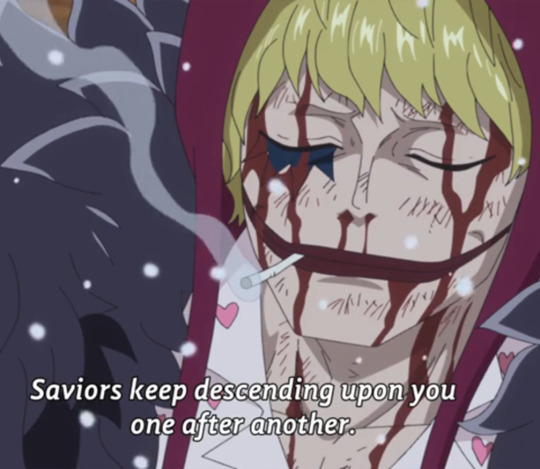
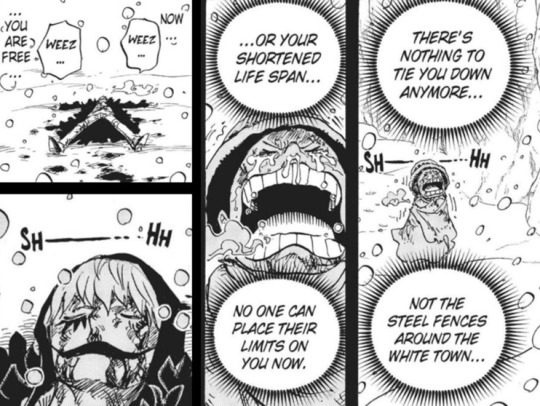
Law clings to that love he was given, he takes all these fundamental teachings and ways of thinking in regards to faith that were drilled into him during his youth, rejects the religion element and applies just about everything else to Corasan. He holds onto the last shreds of what Corasan leaves him with. Corasan becomes his “benefactor” (he gave my my heart), his saviour, his martyr.
And the crazy thing is, Rosinante was never really this saint Law makes him out to be. Law hated the clutz when they first met (mostly on account of Corazon throwing him through a glass window down at least two stories and into a pile of scrap). Corazon initially showed nothing but contempt for his presence (to ward him and the other children away from the Donquixote family, but these are still extreme measures). And it wasn’t until after learning Law’s name that Rosinante dragged him kicking, crying and screaming from hospital to burning hospital (not very saintlike in of itself), even after Law begged him to stop. Rosinante became Law’s saviour partly because of his belief in the will of D., and probably due to some guilt being a Donquixote, but mostly because he has always had a bleeding heart and he pitied (and had very quickly come to love) this angry, sick, deeply lost little kid. All this to say that Law’s faith in Corasan – this saintlike figure Law upholds him as in the future and the lengths he’s willing to go to avenge him/fulfil Rosinante’s purpose reflects the strength of the absolute beliefs Law would’ve been raised with in regards to God.
Whether it be out of survivor’s guilt (just one more body to heap on top of the Flevance pile), his love for Corasan, or for the sake of taking vengeance on the man that took away the one good thing he’d been able to regain in his miserable life, Law adopts Corasan’s will, the will of D. (which in of itself seems divine in nature), incorporates it into his new belief system, actively takes on the role of the divine punisher/justiciar and dedicates his life to bringing down Doflamingo.
3. Luffy
Catholicism dictates that the entirety of someone’s beliefs should be dedicated to one true cause (that cause being God) and expects people to ride on that, letting it carry them through life, give them hope, purpose, etc. But a lot of former Catholics choose instead to find that through something else. Corasan ignited the spark in Law’s faith around the will of D., but it’s not until he meets Luffy that this really becomes something that feels tangible and real for Law.
When Law saved Luffy in Marineford (putting the heart crew in danger for a stranger he met once), he said he did so “on a whim”, but that seems incredibly ooc for Law — this man that pretty much planned out how the rest of his life would go after the dust of Corasan’s death settled and he came to terms with the fact he wasn’t going to die at age thirteen like he’d originally thought. Circling back to the concept of Law being a sole survivor/messenger for God, it is interesting that Law is the one to seek out Luffy (given that Luffy is usually always the one either being abandoned by people or recruiting his crewmates), and Law is ultimately the catalyst for pulling him towards Dressrosa and Wano. There must be a REASON that led to Law deciding Luffy to be the most viable option out of the Worst Generation for an alliance (beyond blind trust in an unhinged captain that just so happens to also bear the initial D, and Luffy being one of the few captains crazy enough to go along with what Law was cooking up).
Law undoubtedly would’ve kept a peripheral eye on Luffy for some time before officially meeting him due to him being a rising competitor pirate and another “D” (I imagine the news of his utterly insane exploits would’ve made good reading material, too). The first time Law lays eyes on Luffy in Sabaody though, he still blows all expectations out of the water — crashing headfirst into the crowd of a slave auction and immediately committing a felony against a member of the most powerful upper one percent.
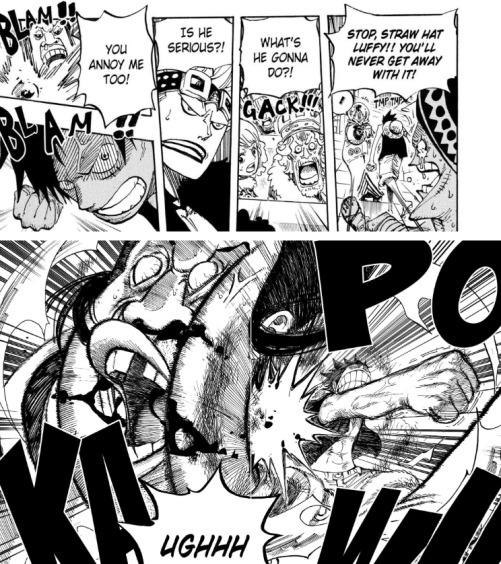

The world nobles are at an “untouchable God” tier in terms of class standing and believe it’s only natural for them to be entitled to whatever and whoever they want in this world that’s beneath them – the same kind of self-aggrandizing false divinity that Law has a a lot of repressed rage towards and that the will of D. is fated to oppose, so this, understandably, is a highly compelling first encounter, but it’s really only an initiating factor for what ultimately draws Law to Luffy. From their very first meeting (and probably before then, in the news stories and rumours Law likely picked up on), it’s made abundantly clear that Luffy does what he wants without a second’s hesitation, no matter the consequences, simply because he feels it is the right thing to do. Some call this an iron will, Law would be more inclined to call it willful stupidity and trouble, but time after time Luffy somehow manages to pull off what Law would best describe as “miracles”. And Law believes the straw hats just might be the ones to drum up another one for him.
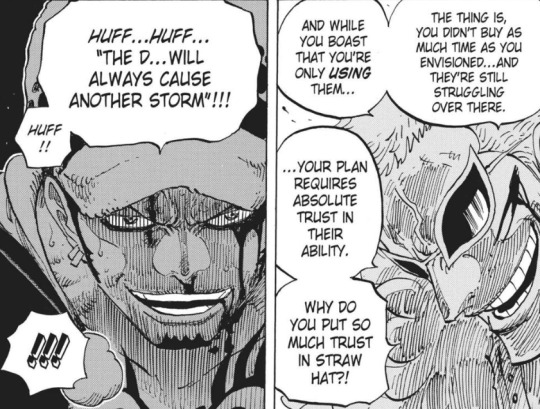
Luffy’s also got a lot of passing resemblances to Corasan going for him, e.g. inherently kind, compassionate liberators with big dumb hearts and wide goofy smiles in spite of everything they’ve been through, treating Law as nakama and saving his life despite his protests etc. All of which I’m sure Law hasn’t been completely unaffected by despite the high walls he puts up. And the more Law learned about Luffy the more it probably became clear that he is the antithesis to Doflamingo, i.e. what makes Luffy so goddamn dangerous and terrifying beyond his physical power is his ability to make friends with a simple kind of unconditional love that gets reciprocated enough so that these friends are willing to die for him.
Luffy agrees to the alliance, they successfully blow up Caesar’s base, and head off to Dressrosa. Now’s the time I should bring up that it’s taught in Catholicism that self sacrifice is the ultimate heavenly deed, and here Law is undoubtedly prepared to be a martyr for his cause. Law sends away his crew to Zou before Punk Hazard with the expectations that he’d never see them. He cultivates a fierce emotional detachment against Luffy’s willingness to bring him into the fold of the straw hats, and is resolute in that when the time comes, he will handle this himself, he will carry out Corasan’s will, and if he has to die for it, he will die with Corazon’s name plastered on his back. (Note here that Christianity is contradictory in that Law being this ready to die here is a sin, because revenge and suicide are highly discouraged, so you could say that by avenging and dying for his saviour, Law would be committing both the ultimate sacrifice and the ultimate sin).
Things get very dicey for Law in Dressrosa, to put it lightly. Doflamingo reveals that he was a celestial dragon (linking back into the will of D. “enemy of the Gods” notion), puts Law on the backfoot and gives him a thorough beating before shooting Law with a couple dozen white lead bullets in front of Luffy (because even when he’s winning Doffy loves to be a cunt about it). By the time Doflamingo is cuffing Law to the heart seat, it’s all looking pretty grim, and it’s very apparent when Luffy shows up to save him, that he is ready to die.

Law here has given up. He spent years planning his revenge for Corasan, but he lost, and he has very little left in the tank (physically, emotionally, spiritually). But Luffy doesn’t listen. Luffy who doesn’t think, doesn’t care, who trampled all over Law’s carefully laid out plan from the get-go and who is willing to take on Doflamingo single handedly for the simple slight that he dared to harm Luffy’s friend Law. Law will never find peace in his own demise because Luffy doesn’t do peaceful. He does loud and unashamed and open with no rhyme or reason other than the excruciatingly simply fact that he loves people and he thinks the people he loves deserve to have good lives. Luffy chucks Law over his shoulder and drags an injured Law across the city despite his protests (sound familiar?) and in the process inspires the fighting spirit in Law again.

When Law confronts Doflamingo again with Luffy in tow, Law’s faith in Luffy confounds him. The last Doflamingo remembers of Law is this beautifully moldable dark pit of grief and rage who’d given up on believing, period – who wanted the world destroyed. Not so long ago, Law had been a candidate for Doflamingo’s next protégé. Now?
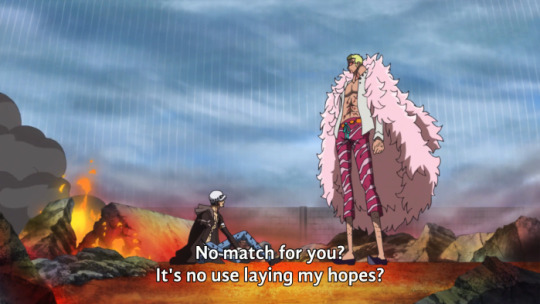


THIS is the action (grinning, staring down the barrel of a gun, flipping Doffy off as he tells him in not so many words that he may kill Law but he will never beat Luffy), Law’s unshakeable faith in the face of his own death is what has Doflamingo realising he will never regain control of Law again – is what incites Doflamingo to go from breaking Law down so he can build him back up again, to conceding defeat and outright killing him.
The trust that Luffy inspires in Law and the way he talks about Luffy (Luffy being this powerful, miracle-inducing liberator that Law can’t comprehend but follows anyway, Law laying down his hopes on him, weaponizing the will of D. to try and provoke fear from Doffy), is very reminiscent of the awe and faith talked about in scripture. Law discovers the feelings of comfort and hope that Catholicism was supposed to give him in Luffy, but Law’s belief in Luffy is a direct rejection of those teachings. Rejection by believing in a real life person as opposed to the divinity he was taught about. He’s also cementing his belief in the will of D., thus rejecting Doflamingo and all the people that embody the sort of “all powerful” divinity that he abhors (i.e. celestial dragons, Kaido, the Gorōsei/five elders) for the embodiment of hope and humanity.

When Law survives (again), he expresses he’d rather see Luffy beat Doflamingo with his own eyes or die with Luffy if he loses than leave. Then he watches, after all this talk of miracles, looking up in reverence as Luffy delivers, bright as the sun, haloed by the bars of a cage that’s haunted him for over a decade, Corasan’s words echoing at the back of his mind. God had never saved or freed Law, but Corasan was there for him, the heart crew was there, Luffy was there. And this is Law’s biggest, clearest rejection of religion – this newfound faith in humanity.
This faith in Luffy is put to the test again in Wano when Luffy is struck down by Kaido, but Law never truly stops believing that he’ll make a comeback. Even when the straw hats doubt whether he’s alive or not, something tells him Luffy’s not dead, and he holds onto that hope.
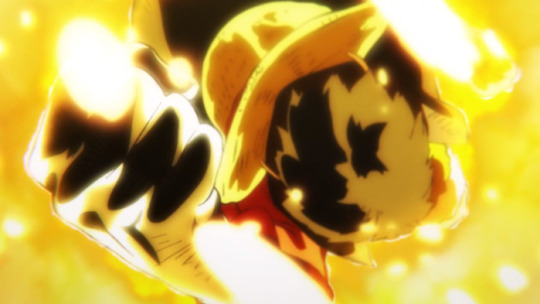







We also have the whole nika/joyboy backstory which really only reinforces all of this imagery/god-fearing looks of awe from Law and this idea of Luffy who is this perfect juxtaposition of empathetic and kind to incredibly fearsome fire and brimstone fighter. And regardless of whether you’re into the ship or not this is the impetus of Law’s relationship with Luffy for me, because here’s Luffy who has every right to have a chip on his shoulder and be downtrodden about all the injustices against him, here’s this little guy who against all odds, in the darkest of places, embodies light and hope and kindness and proves to Law that there will be hard times but there IS a happy ending at the end of the tunnel, despite it all. And everytime Luffy rises to the insurmountable challenge and wins, it just further cements that the will of D. is alive, that Corasan was right, that there's something redeemable in Law, a reason why he was worth saving, even if Law doesn’t understand it quite yet.
#merry christmas law religious trauma be upon ye#what’s an endearing idiot to a non-believer#long post#favourite character thesis statement. or something#ive been wanting to talk about this for a while but just been gathering my thoughts#will preface all this by saying I was not born or raised religious but the concept’s all very compelling from an outsider’s perspective#but I have had conversations about this to people like lesbianluffy who *were* raised catholic and relate to this experience#who I have to thank a lot for helping me wrap my head around this#this is a compilation of thoughts and conversations over the last two or so months#one piece#op#CJ's op watch-through#trafalgar law#monkey d. luffy#donquixote rosinante#donquixote corazon#monkey d luffy#lawlu#trafalgar d water law#gear 5 luffy#sun god nika#wano spoilers#lulaw#op meta#op analysis#one piece analysis
359 notes
·
View notes
Text
Come Back When You Can Make A Whale
This is going to contain some speculation for S3, so you know what to do! Or not do!

SITIS: What did God say?
JOB: Um... I'm not sure. I didn't understand much. Things too wonderful for me. Ostriches came into it.
SITIS: Ostriches?
JOB: And whales. God's very proud of the whale. Went into some detail about... how great whales are.
SITIS: But did They explain?
JOB: [shakes head] I think the point was, if you want answers, come back when you can make a whale.
Whales, huh?
If you aren't well read, this could be quite the misdirection. It should be reasonably obvious, given who is doing the talking - Job - what he is actually referring to, then we can join a couple of dots to make some speculative leaps.
You still with me?
No? Then let us start with how do you make a whale?
By giving it another name.

Leviathan.
Chapter 41 of the Book of Job is all about the Leviathan, a great sinuous sea serpent with impenetrable scales and breath like fire. It sleeps beneath the sea until the end of days. Over time it came to be associated with any sea monster, then anything large, and what is the largest animal ever known to have lived? The whale.
The top of the matchbox is also worth a look. We have a skull and crossbones, which is classic Memento mori symbolism, fitting in with the resurrection theme of the Second Coming - but look at the way the address of the pub is spelt! Now, this not the same way it is spelt on the record single Maggie gives to Aziraphale; Goatgate is spelt as one word, not two. A little bit of searching reveals the meaning behind this fictional address that backs up and reinforces the quote on the side of the matchbox.

Strong's Concordance for 66 gives us "wild, savage, fierce." Goatgate is an interesting one, because it turns out to be a relatively modern term from the urban dictionary, and I'm just going to refer to the polite version of it here - it's another word for "mouth." So 66 Goatgate is a "fierce and savage mouth." Yes, that does sound about right - in more ways than one, once you know who it is. (If you want to look up the impolite version, go ahead - I'm sure you will still find the connotations very amusing.)
Our metaphorical Leviathan is Crowley. He gave the game away at the end of S1 during the appearance-swap.


This also means Aziraphale is his counterpart, Behemoth. Why - well, I made a bit of joke in my post here that he was playing at being a "river horse" while he wallowed in the bath of holy water during his part of the appearance-swap scene. Modern day scholars think the description of Behemoth in the Bible may be that of a hippopotamus in real life history. If that is so, I'd still be betting this is what the "dark horse" comment from Nina in S2E1 is foreshadowing.

Maybe none of this new to you if you've been hanging around the the fandom for a while. That's fine, I'm just trying to establish the scene. And the next bit we need to talk about is this one, where Job gets a lecture from God.

During this sequence, we hear lines that come from Job 38 and 39.
GOD: Job, if you have questions for me, I have questions for you. Do you know how I created the earth? Where were you when I laid the foundations of the earth, Job? Were you there when all the morning stars sang together and all the Angels shouted for joy?
These lines are paraphrasing some of the beginning of Job 38.
Then we have:
GOD: Do you know the rules of the heavens? Did you set the constellations in the sky? Can you send lightning bolts and get them to report back to you? Did you give wings to peacocks, Job, or teach the ostrich to run?
These lines are again, paraphrasing Job, half from 38 and half from 39.
So then, we need to ask, why highlight these lines in particular?
Job 38 is mainly about setting the boundaries of the universe around us. The Earth might seem impossibly huge to a human, but it started with a single stone at its foundation. Earth and the other planets obey certain laws as they move around the Sun. The patterns of the stars in the sky take so long to change that it seems like they are set and inconstant. Even the chaotic form of lightning respects its Creator and returns to its point of origin.
From the last part of Chapter 38 to the end of 39 God challenges Job with a list of animals. The theme here is about freedom and wildness. Whether it is a noble lion, a loathsome crow, a nimble mountain goat, the head-strong wild ox or the willing war horse, they all flourish upon the Earth under the sight of the Almighty. Even the mightiest and most fierce beasts of all, Behemoth and Leviathan, have a place, although only God has the means to control those two.
None of this needs a human to be involved. We are so often the center of our own universe, and try so hard to control every aspect of the world around us that we lose sight of the bigger picture. Shit happens. Some things are out of our control. That doesn't mean its your fault and you're wicked and damned to go to Hell because of it. And that was the point God was trying to make to Job. The world is a far bigger, wilder and chaotic than you can imagine, but its also incredibly beautiful, and it runs itself within the rules and limits that seem to be set by invisible forces you can't see.

So back to the script from the show.
The first set of questions from God could apply to both of the duo. They were both around when Earth was created and were more than likely there when the "morning stars" (the highest angels, such as Lucifer, Gabriel, Michael and angel!Beelzebub) sang together.
The second set of questions are the ones that seem to have got the most attention so far, with ops cross-matching them to things Crowley does in S2.
Do you know the rules of the heavens?

Did you set the constellations in the sky?

Can you send lightning bolts and get them to report back to you?

Did you give wings to peacocks, Job...
(I make a suggestion this has something to do with Michael, but also see comments below)

...or teach the ostrich to run?


The first three of those questions are fairly straight forward, and I doubt many would dispute what they are referring to. But the reference to the peacock and the ostrich are more subtle and curious, and I would like to take a moment to look at the actual verse - because it is only one verse that is providing both questions - that is being paraphrased here.
Job 39:13 Gavest thou the goodly wings unto the peacocks? or wings and feathers unto the ostrich?
Did you realize that the King James Version of the Bible is the only one that mentions peacocks in this particular verse? All the other versions mentions the first sentence of that verse in relation to the wings of ostriches: "The wings of the ostrich wave proudly." The ostrich is considered a cruel and witless bird in the Bible, pleased with the way it looks, and seemingly careless about its young.
Why does that sound familiar...



Shax thinks this ostrich feather-clad angel in disguise isn't too smart either.
So using the peacock line is a curious choice in the script. Other than the "eyes" in the tail of the peacock having a connection to Michael's many watchful eyes on the world, it's still not clear how Crowley helped them upwards. Unless both lines are supposed to refer to Gabriel, and how the vain peacock was helped to both fly and run to a distant location in the stars.
Edit: Since I first wrote this, @beebopboom pointed me to some more peacock lore, and this helped me delve a bit deeper into them. Peacocks were associated with wealth and royalty, but they were also associated with immortality in early Christian beliefs. There was a belief that the flesh of the peacock did not decay after its death. The bright colours in its tail came from its eating venomous snakes, which reminded people of Christ becoming sin for humanity's sake (think of Crowley downing the laudanum to save Elspeth from Hell in the crypt in 1827, its a similar action.) The "eyes" on the males tail also represented the all-seeing eye of God. So we have a connection with both royalty and resurrection here.
(Oh - just as an interesting connection here - a number of the newer versions of the Bible not only don't mention the peacock in this verse, they compare the ostrich to the stork! The meaning is meant to be that the stork cares more for their young than the ostrich, but if you read the words at face value, you could take a double meaning away...)

Let us return to questions, answers, and whales.

Questions. Always questions. It's like the proverbial toddler who's always asking a never-ending string of "but, why?" for funsies and you just want them to shut up for a moment and think about the last thing you said first. They, too, are a bit like Job. They are the center of their own universe at that age, having not had much experience of the world. They have no grasp of how far it extends beyond them, and how little even we as adults know.

If at this point you're going "oh, no, no, no, no, op, please don't tell me the point of this meta is it's all ineffable," relax. I'm not.
The point was to set you up for some nice, juicy, awesomely sweet S3 speculation.
Because I believe Crowley will finally get to ask his questions of God.
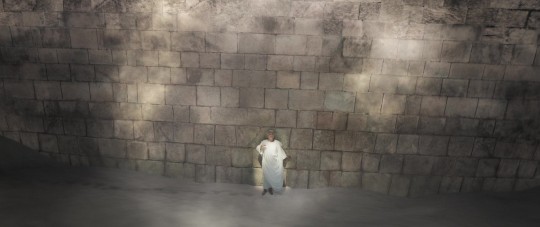
(oh lordy, I made the mistake of taking a break to have a shower before trying to finish this off, because I was having trouble seeing how to finish this in a tidy way, and that caused me to have "shower thoughts" and now the nice sweet simple speculation has turned into a slightly bat-shit crazy kind-of one, although still on the same track as what I was originally thinking. Here goes...)

We have this three card spread from waaay back at the beginning of S1. We all think its something to do with the three babies.
What if its not?
Because we need something like this to happen again - Aziraphale and Crowley either side of a third protagonist. What if it's the King of Kings, Love personified, Jesus, in the middle? (Or Adam again, I wouldn't discount that option either...)

If you would look at the GIF and the screenshot together again and go, well that makes, sense, white for the angel on the right, and green for the demon on the left, I would jump up and shout at you - NO!
Look at the cards again! In the Tarot, that's the Ace of Swords on the right - it belongs to Aziraphale. It's a very powerful card, about new beginnings and change.* Lets call the one of the left Knight of Wands, which also represents the element of Fire. Knights are all about movement and journeys. Who owns the Bentley? And look what Gabriel has instinctively done with his hands - he has held his screen-left hand out to Aziraphale, the Sword, the angel who wears green, and his right hand out to Crowley, the Knight of Fire. The yin and yang qualities are actually swapped. That was what I was trying to tell you in this post. They aren't as obvious as they seem at first glance.
And love is the answer, it turns out. Did you see my comment the other day on another post? In Strong's Concordance 25 = to love.
Anyway, we should get a third parallel scene somewhat like this, and like when Aziraphale and Crowley took Adam out of time to talk to him in S1.
Only this time the three of them (with who ever is in the middle) should be having a talk with God about what is or isn't supposed to happen.
JOB: I think the point was, if you want answers, come back when you can make a whale.
Crowley could be a literal serpent (though I would be very surprised if he did manifest that way) but it should be a metaphorical Leviathan that stands before the Almighty to ask his questions and get his answers. And it will be that he has earned the right to be there, because he finally understands the lessons of Job.
@makewayforbigcrossducks I hope this answers one of your questions
*The Ace of Swords speaks of new beginnings, but it is a two-edged sword that can cut both ways. It is strength in adversity, victory out of struggle, good out of evil, a change in the old order on the way.
#good omens#good omens 2#good omens meta#crowley#aziraphale#job minisode#book of job#leviathan#behemoth#i only ever asked questions#come back when you can make a whale#gabriel#shax#did you give wings to peacocks?#teach the ostrich to run#king of kings#king of hearts#yin to his yang
202 notes
·
View notes
Text
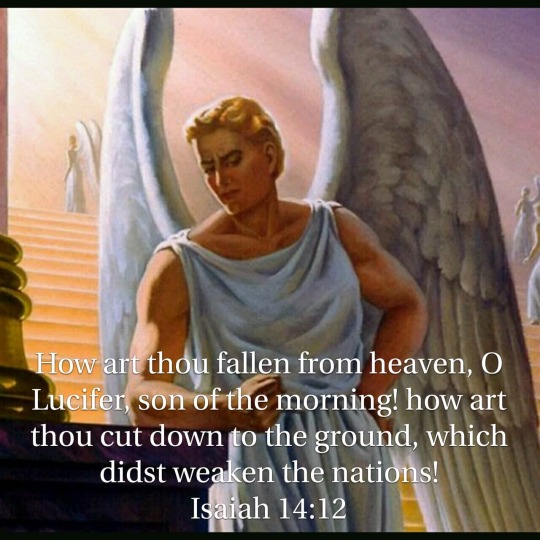
“How art thou fallen from heauen (o Lucifer) thou faire mornige childe? hast thou gotten a fall euen to the grounde, thou that (notwithstondinge) dyddest subdue the people?”
-The Coverdale Bible 1535
“How art thou fallen from heauen (O Lucifer) thou faire mornynge childe? how hast thou gotten a fall euen to the grounde, and art become weaker then the people?”
- The Great Bible 1539
“How art thou fallen from heaven, O Lucifer, son of the morning? and cut down to the ground, which didst cast lots upon the nations?”
-Geneva Bible 1560
“How art thou fallen from heaven, O Lucifer, son of the morning! how art thou cut down to the ground, which didst weaken the nations!
- King James Version 1611
“How you are fallen from heaven, O Day Star, son of Dawn! How you are cut down to the ground, you who laid the nations low”
-English Revised Version 1885
“How art thou fallen from heaven, O day-star, son of the morning! how art thou cut down to the ground, that didst lay low the nations!”
-American Standard Version 1971
“How you have fallen from heaven, morning star, son of the dawn! You have been cast down to the earth, you who once laid low the nations!”
-New International Version 1973
“How you are fallen from heaven, O Lucifer, son of the morning! How you are cut down to the ground, You who weakened the nations!”
- New King James 1982
“How you are fallen from heaven, O Day Star, son of Dawn! How you are cut down to the ground, you who laid the nations low!”
- English Standard Version 2002
Be careful!! God had made the Bible to be understood plainly. Overtime men had changed words and or phrases thinking that it’s a necessity to be more plain, while in reality their mystifying that which is plain due to traditions. Gods word as a whole, is a perfect chain, one portion linking into and explaining another. True seekers for truth need not err, for not only is the Word of God plain and simple in declaring the way of life, but the Holy Spirit is given as a guide in understanding the way to life therein revealed.
#seventhdayadventist#jesus christ#bible verse#christianity#christians#god#religion#scripture#biblical#god's love#love#faith in the lord#faith in jesus#faith in god#keep the faith#christian faith#faith#faithinchrist#bibleverse#bible reading#biblestudy#the bible#bible scripture#bible quote#bible study#bible#bibleprophecy#10 commandments#holy bible#christian bible
13 notes
·
View notes
Note
do you have any advice on picking a good new name for oneself? i don't feel connected to my current one and would like a more spiritual one but i don't know how to pick the "right" one
Hi, beloved! You asked this ages ago so it's very possible this is no longer relevant to you. If you have one—congratulations on the new name! Either way, I'll answer, hoping I can help you or perhaps someone else who's thinking about this!
Name changing happens often in the Bible—it's usually symbolic in some way, and often very dependent on the meaning of the name. Abraham (formerly Abram) and Israel (formerly Jacob) both have their names changed in an encounter with God and an angel(? debatable), respectively; Jesus renames Simon "Cephas/Peter," which means "rock;" Saul starts being addressed as Paul (the Latinized version of his Hebrew name) as he becomes more active in Christian communities and leaves Judaism further behind. People entering monasteries/convents often pick a new name, and Catholics traditionally choose a saint's name for their confirmation. You have lots of holy company, is what I'm trying to say!
Finding a name in the Bible could be your place to start—I love the figure in Luke's gospel I'm named after, and her calling as a myrrh-bearer inspires me immensely. If there's a figure that's close to your heart, who mirrors your journey, who you aspire to follow, you could choose their name, especially if you connect with its meaning! This website lists Biblical names/origins—it doesn't seem to include sources, so I can't verify every single one (maybe check another source to be sure about something), but from skimming it it looks useful/accurate!
As I mentioned, choosing a saint name is also very common—and there are tons to choose from! Even if you're not Catholic and whatever your theology about saints, people who Christian communities remember and honor can give you inspiration and meaning. Catholic.org and Wikipedia both have pretty exhaustive lists—you could narrow it down by thinking about time periods, patronage, location, tradition, or anything else that's meaningful/relevant to you.
Naming a child with a family/cultural name is obviously common, and that could be something you do for yourself as well! Connecting with your ancestors/communities could help you feel more connected to yourself.
I've mentioned it, but a lot of people think about the meanings of names. There's tons of iffy information out there, so I would recommend looking at multiple sources (I know this because I used to use baby name websites to name fictional characters, and some of them were just completely contradictory!). There are biblical concepts, like Sophia/Wisdom, but you could think about any concept/value/theology you connect with and go from there.
Any decision can be spiritual when we approach it purposefully, and I think any name could be spiritual if you find meaning in it. I can't promise there's one "right" name—the people I know who found new names took time and tried some out along the way. It might be more of a choice, a mindful acceptance, rather than a lightning bolt out of the sky moment of resurrection. You also don't have to have a deep connection with a name—you've said you want one, so of course I support that, but it's not, like, wrong to just… have a name. (If you're reading this and you've never thought about your name/its meaning in your life, I support you.) However it works out, I wish you (and anyone else thinking about this) courage and curiosity as you seek out a new identity.
The thought I leave you with is this (if you'd like it): God calls us by name—sometimes that's the moment we see Them fully. What name do you want God to call, what name would wake you from sleep and cause you to genuinely respond with, "Here I am; you called me"?
<3 Johanna
P.S. I found two prayer rituals for renaming while looking around, and I thought I'd link them—one of them is specifically for gender transition, but parts of it could be meaningful for anyone!
Unitarian Universalist Transgender Renaming Ceremony
Episcopal Service of Renaming from The Book of Occasional Services (pg. 120)
57 notes
·
View notes
Text
There is alot of really bad theology right now. NAR, Word of Faith and old heresies ( Like reinventing Modalism) are running rampant online that are being perpetuated by so called big-A apostles, prophets and people who claim to perform miracles.
If anyone, and I mean ANYONE, who claims to be an Apostle (specifically of Jesus Christ -- There are only 12.) or a prophet and teaches things that not only are not in the Bible but ask for a 'seed offering' or any kind of monetary gain or deviate from what has been written, they are to be called out as wolves and false teachers. They commit spiritual abuse against people who want to be free from pain and sin by exploiting them, selling them a false bags of goods and keeps telling them to come back again and again to get their 'deliverance from the demon of anxiety.'
These are the 'demon slayer' group, the guys who think that born again Christians can be possessed by demons. Are you flipping kidding me?! Can a demon be in the same vessel of the Holy Spirit who is God? Any well read Christian would know that according to Scripture, its utterly bogus.
Then when they have been taken advantaged of for so long and get out, some remain Christian by the grace of God and fall into the footsteps of true Christianity but most will remain in the hands of wolves. Being fleeced, lulled by what they want to hear, thinking that perhaps being a spiritual person is better then being a biblical person.
The doctrine we have in Scripture rightly tells us about God's Character, Promises, and our salvation outside of our experiences and emotions. Emotions and experiences are different and change, they are secondary to the Scriptures.
But what these NAR--New Apostolic Reformation--folks do is they twist doctrine in that God is now calling new Apostles and prophets to rule the Church. They lull people into their prophetic words and sayings, telling people what they want to hear. Using experience and emotion to get people hooked into their teachings.
I've seen a couple of people on here who post such teachers and this I tell you; run. Run far away from those wolves, they will only bring you to spiritual death and destruction. You posting those teachers can actively stumble others who were brought out of this movements.
Its doctrine like this that strays people away from a full filled Christian life, binding them and presenting a false version of Christianity to the world. Its doctrine like this that will produce rotten fruit.
Now I am not saying that miracles are not for today but it solely depends on God's will, not ourselves. We don't get to decide what gift God gives us and certainly if God has given these gifts, He would give them to whoever He so well pleases.
Find yourself a biblical church, committed to expository preaching. Ask God to get you to a biblical church with a equally biblical pastor. Look at resources like Ligonier Ministry (R.C Sproul) , Crossway, Pirate Christian Radio, The Messed Up Church, White Horse Inn and Founders Ministry.
If you are coming out of the NAR, I highly recommend Pirate Christian Radio (Fighting for the Faith on Youtube) and The Messed Up Church. I would highly recommend Dawn Hill , she came out of the NAR and has since repented of the things she had done in that movement. Lovely lady.
I implore you, and anyone else who is finding themselves falling into these churches. I pray that those wolves repent and turn.
#christianity#new apostolic reformation#nar#christian life#christian#christian living#christian doctrine#biblical scripture#absolute buffoonery in some of these NAR churches#Im dead serious#look at Church by the Glades or Chuck Pierce's church#madhouses
13 notes
·
View notes
Text
The Antichrist & rapture are close. Go to Messiah2030 on YouTube to see how 53 Bible prophecies point to 2030 being the return of Jesus Christ. They also line up with The Great Reset of 2030. Be ready. Study God's word and preach Jesus Christ. Keep repenting & preach repentance. We're saved by grace through faith in Jesus Christ, alone. 666 is the number of a man - The Antichrist. The Illuminati is preparing the world for the Antichrist & the Mark of the Beast. Pope Francis said atheists are covered by the blood of Jesus without faith. Pope Francis said all religions lead to God & should be embraced. He said non-Christians are children of God. He said God made some people gay. Pope Francis said Jesus' life & the cross ended in failure. Pope Francis said Jesus is not a spirit, but a glorified man. Pope Francis said it's absurd to think that anyone can have a personal direct relationship with Jesusp Christ. Pope Francis said that Mary is the road we must travel to reach God. These are all lies from Satan. Pope Francis is possibly the False Prophet from the book of Revelation. If so, he will usher in the Antichrist from Revelation 13. Nobody in the Bible prayed to Mary. Purgatory is unbiblical. Watch the video Pope Francis and His Lies: False Prophet Exposed on YouTube. Also watch Are Catholics Saved on the Reformed Christian Teaching channel on YouTube. Friends should draw you closer to holiness & Jesus Christ. If they pull you towards sin more than holiness then you should walk away. Obey Jesus Christ over everyone. Get the gotquestions app & a Bible app that reads to you like You Version. Put the New Testament on repeat. Get a study Bible. Preach the gospel of Jesus Christ! It's way more important than you think.
14 notes
·
View notes
Photo
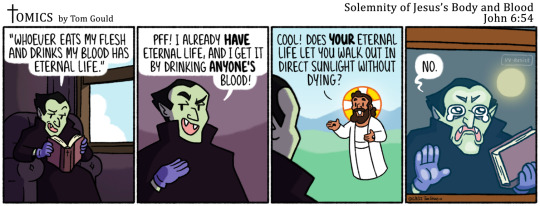
06/17/2022
His name is Vamp... the Vampire.
___
JOKE-OGRAPHY:
A vampire sits comfortably beside his UV-resistant window, wearing his holy-proof nitrile gloves to read an unofficial photocopy of a Bible untouched by apostolic successors. As he reads, he chortles to himself at Jesus's quote about consuming His Body and Blood to have eternal life. The vampire chortles, of course, because while Christians are busy devouring their one and only God for eternal SPIRITUAL life, the vampire boasts a much more convenient version of their practice, whereby he simply drinks ANYONE'S blood to sustain his eternal PHYSICAL life. As he muses about this most hilarious hole in religious thinking, Jesus appears outside the vampire's window, as He was wont to do back in the 1820s, which is obviously when this is taking place. Jesus stands in direct sunlight and asks if the vampire's version of eternal life allows him to do the same, to which the vampire must, sadly, admit that it does not. It also doesn't allow him to (among other things) cross running water, enter consecrated ground, overcome the humiliation of young adult novels featuring his ilk, or make up his mind about what his powers and weaknesses actually are, but fortunately for him, Jesus decides not to rub it in.
AUTHOR'S NOTE:
This is yet another Tomics Resurrection, where I've taken a comic from -- oh, what has it been now? -- 35 years ago (or thereabouts) and breathed new life into it! Here's the original for comparison:
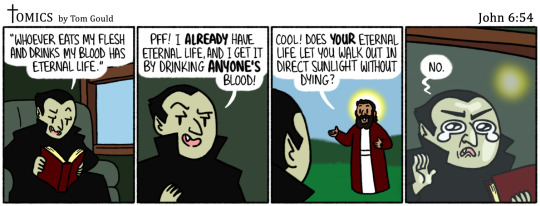
#jesus#bible#catholic#christian#vampire#vamp... the vampire#uv resistant window#holy-proof nitrile gloves#unofficial copy of a bible untouched by apostolic successors#not the sun in the sky... the son of god
273 notes
·
View notes
Text

“As it is written: There is none righteous, no, not one.” (Romans 3:10, Psalm 14:3)
“It Is Written” By Bob Yandian Ministries:
“This quotation (“it is written”) is found in many parts of the Old Testament, the prophets as well as the Psalms. Our verse in Romans 3:10 simply shows God’s word has much to say about itself. But the most important thing is the atmosphere contained in the Word through the whole of the Old and New Testaments. There is no need of any outside source to prove itself. Why is this important? Because the word becomes a part of our lives, controlling, stabilizing and guiding every move we make. We become self-sufficient because the word in us is self-sufficient. We need no outside support or proof of our belief in our relationship with Jesus Christ.
The world compels us to compare ourselves with other religions, philosophies or political views. There is no higher standard in our life than God Himself and His Word. Jesus did not call Himself, “a way”, or “a truth.” You never look for “a truth” to support “the truth.” Jesus is the only way and the only truth. Why do we need anything else?
Old and New Testament Self-Verification: The Old Testament says many times of itself, "thus says the Lord", as well as “it is written.” And the New Testament simultaneously declares, "it is written.” The scriptures do not defend the fact they are written by God. God does not treat His word as theory. Through the inspiration of the Holy Spirit, the word treats God’s authorship as fact as we do the theory of gravity.
It Stands Written: A more correct Greek way of saying “it is written” is, “it stands written.” In the New Testament, the meaning of the word written, found in the phrase “it is written”, is in the perfect tense. The perfect tense means the action happened in the past with results that keep coming to the present. Simply put, it stood written long before it was written. It was known by God from eternity past and it only found its way onto parchment when the writers of the Bible transcribed what they heard from the Holy Spirit. The Word of God is eternal. How can something that began in time be used to support something that is timeless?
All of it Has to be True: Jesus handled the Old Testament as the sword of truth in the four gospels. If you do not believe one part, how can you believe any part? If you do not believe what Jesus said about the Bible, then you do not believe what Jesus said about Himself. For He declares Himself to be the revealed word of God and the fulfilment of Old Testament prophecies written about Himself as the only means of salvation for all mankind.”
[The rest of this Web Article is here.]
[According to Answers.com, “The phrase “it is written” is in the King James Version of the Bible in 80 verses.”] Amen! 🙌
#bible#christian blog#god#belief in god#faith in god#jesus#belief in jesus#faith in jesus#christian devotionals#bible verses#bible truths#bible scriptures#bible quotes#bible study#christian life#christian faith#christian encouragement#christian living#christian inspirational quotes#christian inspiration#christianity#christian motivation#christian quotes#encouragement#keep the faith#make him known#bob yandian#romans 3:10
25 notes
·
View notes
Photo

Rescue Me, O LORD, From Evil Men
1 O Lord, take me away from sinful men. Keep me safe from men who want to hurt others. 2 They make sinful plans in their hearts. They always start wars. 3 They make their tongues sharp like a snake’s. And the poison of a snake is under their lips.
4 O Lord, keep me from the hands of the sinful. Keep me safe from men who want to hurt others and have planned to trip my feet. 5 The proud have hidden a trap for me. With ropes they have spread a net. They have set traps for me beside the road. 6 I said to the Lord, “You are my God. Listen to the voice of my prayers, O Lord. 7 O God the Lord, the strength that saves me, You have covered my head in the day of battle. 8 O Lord, do not give the sinful what they want. Do not let their plans work, or they will be honored.
9 “As for those who gather around me, may the wrong-doing of their lips come upon their heads. 10 May burning coals fall upon them. May they be thrown into the fire, into deep holes, and rise no more. 11 Do not let the man whose talking hurts people stand in the land. May trouble hurry to catch and destroy the man who wants to hurt others.”
12 I know that the Lord will stand by those who suffer and do what is right for the poor. 13 For sure those who are right and good will give thanks to Your name. Those who are right will live with You.
— Psalm 140 | New Life Version (NLV)
New Life Version Holy Bible Copyright © 1969, 2003 by Barbour Publishing, Inc.
Cross References: 2 Samuel 22:49; 1 Kings 8:45; 1 Kings 8:49; Esther 9:25; Job 18:9; Job 30:12; Psalm 7:14; Psalm 7:16; Psalm 10:2; Psalm 10:9; Psalm 10:15; Psalm 11:6; Psalm 17:13; Psalm 34:21; Psalm 36:4; Psalm 36:11; Psalm 94:23; Psalm 97:12; Psalm 116:1; Psalm 118:14; Psalm 119:170; Psalm 138:2; Psalm 144:10; Matthew 3:10; Romans 3:13; James 3:8
#prayer#help#rescue#wicked men#Psalm 140#Book of Psalms#Old Testament#NLV#New Life Version Holy Bible#Barbour Publishing Inc.
5 notes
·
View notes
Note
I want to read the holy bible but I’m not very sure of which version I should read. What would you recommend?
This really depends on what denomination that you're inquiring into in terms of what's considered Canon and what isn't.
The Orthodox Church has 76 books in the Bible.
The Catholic Church has 73 books in the Bible.
Protestantism is a bit harder to quantify as some denominations might personally choose to remove or add books. But for the sake of convenience we'll say they have 66 books in the Bible.
Translations are mostly down to whether the translator wants the book to be a very literal word for word translation to the original texts or if they want to make it more accessible or poetic. And there are translations that try to balance the two. While there are certainly translations that aren't so,,, good(?) The difference between translations doesn't make one of them necessarily wrong over the other.
The Catholic Church has 'approved' translations, and if you're interested in Catholicism then I would recommend one of them: https://www.usccb.org/offices/new-american-bible/approved-translations-bible. I personally used the NRVSCE a lot. You could reach out to a Priest in your area and ask what translation they use for the Mass or what one they'd recommend.
If you're interested in Orthodoxy, I would also still recommend reaching out to a local Orthodox Priest for a recommendation, although if English is your first language then I would suggest the 'Orthodox Study Bible'. The local Romanian Orthodox Church here use that for saying the readings in English.
From my understanding with Protestantism, there isn't really an approved translation (although the priest or pastor might still be able to recommend you one). I've watched a lot of Protestant Bible collection videos, and they often use a range of translations and styles.
If you're new to the Bible (or returning to it after a long time), I would recommend finding a study Bible and focusing on reading the Gospels (and then the rest of the New Testament). As they will be the most accessible for you and will be able to provide you with notes and explanations on vocabulary and historical notes.
If you're not attending a Church, then I would look into Churches in your area and consider attending one. The faith was never intended to just be someone reading the Bible alone in their room without any connection to other people, and we should consider it in relation to the communal aspects and life of the Church itself to more properly understand it. If you're not sure on what denomination yet, that's fine. Reach out to Priests, speak with them, attend different kinds of Churches, pray about it.
5 notes
·
View notes
Text
In addition to my studies on the "Lost and Excluded Books from the Bible." series.

INTRODUCTION TO THE LOST BOOKS OF THE BIBLE
The Lost Books of the Bible by Rutherford H. Platt, Jr., 1926 and By DR. FRANK CRANE
The great things in this world are growth. This applies to books as well as to institutions.
The Bible is a growth. Many people do not understand that it is not a book written by a single person, but it is a library of several books which were composed by various people in various countries. It is interesting to know how this library grew and upon what principle some books were accepted and some rejected. Of course we may take people's word for the reasons why certain books were chosen, but it is always satisfactory to come to our own conclusions by examining our own evidence.
This is what this Lost Books of the Bible enables us to do. We can examine the books of the Scriptures which we have in the authorized version, and then in this book we can read those scriptures which have been eliminated by various councils in order to make up our standard Bible. It is safe to say that a comparison of the accepted books with those rejected may be relied upon, for those books which were accepted are far superior in value to the others.
These others which are included in the Lost Books of the Bible comprise all kinds of stories, tales and myths. No great figure appears in history without myths growing up about him. Every great personage becomes a nucleus or center about which folk tales cluster. There are apocryphal tales about Napoleon, about Charlemagne, about Julius Cæsar and other outstanding characters.
It is impossible that a man representing so great a force as Jesus of Nazareth should appear in the world without finding many echoes of His personality in contemporary literature—many stories which grew up about Him as time elapsed. What these tales and stories are, just how He appears to the fictional minds of His day and afterwards, it is interesting to note.
Very often the fiction writer depicts life and the great truth of life better than the historian. He does not pretend to write down what is exactly true, but he tinges all things with his imagination. His feelings, however, may be just and reliable. The reading of this Lost Books of the Bible is interesting as a matter of course. All who in any way are attracted by the personage of Jesus are interested to know any stories that may have grown up about Him.
They are also valuable because they enable us to get many a point of view which otherwise would have been lost. History may be true, but in a sense tradition is even truer. It has been said that history records what has been, but tradition tells what ought to have been.
It must be remembered also that such a thing as historical accuracy is a comparatively novel product. The older writers never dreamed of it. They wrote in order to be interesting, not to tell the truth. And it is a remarkable fact that the events recorded in the Holy Scriptures, as far as we can find out, were most of them veritable, and the chroniclers were truthful. In this volume all these apocryphal volumes are presented without argument or commentation. The reader's own judgment and common sense are appealed to. It makes no difference whether he is Catholic or Protestant or Hebrew. The facts are plainly laid before him. These facts for a long time have been the peculiar esoteric property of the learned. They were available only in the original Greek and Latin and so forth. Now they have been translated and brought in plain English before the eye of every reader.
The ordinary man has therefore the privilege of seeing upon what grounds the commonly accepted Scriptures rest. He can examine the pile of evidence and do his own sifting. Thousands of people to-day look to the New Testament narrative as their leader and guide. It is important to know upon what authority this rests, and many a man will be delighted to find the evidence thus clearly presented before him.
The Lost Books of the Bible present all sorts of matter before the curious eye. There are stories about Mary and instances of her personal life. There are other stories about the boyhood of Jesus and instances about His crucifixion. All of these become important because of the central figure about whom they revolve. No man has ever appealed to the imagination of the world and so played upon its feelings as has Jesus of Nazareth. It is interesting to know what forms of stories and speculations about Him took place in the early period of the Christian era.
In other words, the ordinary man is invited to take his place in that council chamber which accepts and rejects the various writings of Scripture. It is safe to say that the conclusions desired can safely be left to his common sense. It can no longer be said that our Scriptures were accepted by learned men; you do not know that, but you must accept their conclusions. Now it is shown you upon what grounds these conclusions rest.
As a believer in the authenticity of our accepted Scriptures
I have no hesitancy in saying that I am perfectly satisfied to let the common sense of the world decide upon the superiority of the accepted text. The publication of this book will do good because it takes away the veil of secrecy that has hidden for many years the act of the church in accepting certain Scriptures and rejecting others. All of the grounds are rendered perfectly intelligible to the common man.
The Lost Books - http://play.google.com/store/apps/details?id=losts.books.bible.AOVVOECGBSPCKJOZJR
#christian blog#jesus#bible reading#christian doctrine#bible scripture#biblical#glorytogod#bible#faith in jesus#bible study#original book#original biblical studies#read your bible#bible verse#bible devotions#bibledaily#bibleposting#christian bible#biblical studies#spiritual healing#share the gospel#word of god#gospel#kingdom of heaven#faith in god#follow jesus#belief in jesus#jesus christ#jesus is coming#biblestudy
3 notes
·
View notes
Text

By Chad Hewitt
In 1998, I was a fifth grader at a Catholic school in a small town in Ohio. This meant school uniforms, mass twice a week (or more, if there was a holy day that week), and a strict adherence to the principles outlined in the Catechism of the Catholic Church. These principles included two types: the fundamentals of Jesus’ teachings, like the Beatitudes (“Blessed are the persecuted”) and then others, never explicitly stated in the Bible but upheld within society over thousands of years and filtered down into the parochial school system (i.e.“Don’t be gay”). The former were taught through Scripture, sermons, and sacraments. The latter were enforced by other kids, television, and my developing pre-adolescent brain.
As the youngest of three boys in my family, I learned how to operate within these sometimes conflicting paradigms. “Love thy neighbor as yourself”, but only if your “self” is a certain thing; “thou shall not lie”, unless it’s about something like your sexual orientation. Then by all means, lie, lie and lie some more.
Imagine my confusion when during the course of my usual weekday afternoon routine of watching Total Request Live at my best friend Stiv’s house, a music video premiered by a brand new artist named Britney Spears. While I had absolutely no understanding of what the phrase “Hit me baby one more time,” meant, in that moment I immediately felt something come over me, just like Harry Potter receiving his wand for the first time. I had no idea what kind of wand it was exactly but I would soon find out that most of the other boys didn’t even receive their letter to Hogwarts. Yes, we would all agree that Britney was “hot”, but I sensed that the way I felt about her was different and wouldn’t be shared, much less celebrated, by my friends at school. The girls, maybe. The boys, very unlikely.
But if we’re being honest, who doesn’t like Britney Spears? If you find yourself in a room of people who don’t turn the fuck up during “Toxic” then that room, quite frankly, is dangerous and you should get out. The difference was that I loved her for other reasons. Reasons that I couldn’t really put into words and probably wouldn’t even if I could. Reasons that pointed to something about myself that I was taught for so long was shameful and bad. Reasons that, if embraced, would upset my entire worldview and consequently, the relationships that were formed through it. At that time I wasn’t even totally sure if these feelings were real or not, but I did know that sooner or later, I would have to confront them. When I did let myself imagine my life in the context of these fears, the best-case scenario was loving a person that the Church would not consider acceptable, and that would mean a blatant rejection of Christ's love. And so I ultimately had to choose. God’s will or mine. To spare myself the sense of grief and loneliness I would feel from turning my back on God, I dug my heels in, so to speak.
Thus, Britney became the first of many of my guilty pleasures. Since I wasn’t necessarily “allowed” to genuinely love her, I had to love her ironically, justifying my requests for her songs at school dances as a joke. Through my high school and college years I had many more of these “guilty pleasures”, always justifying things that made people even slightly suspicious as an ironic interest and never serious. Because if enjoying those things made something else true about me, then all hope for my eternal soul was lost. *collapses on a chaise lounge*
Recently I had my 34th birthday party, and since Jesus didn’t get to have one of those, the theme was “What Would Jesus Have Done?” Everyone had to dress up as some version of Jesus, whether real or made up. My boyfriend did exceptional work in coordinating the party, which was replete with bespoke cocktail menu (including my favorite, “The Gay Wedding at Cana”), communion wafers as snacks, and a neon cross. I showed up in a priest's robe, and some people didn’t quite understand why, given the theme’s parameters. It was meant to be ironic: I was in costume as a version of myself that might have been if I had never come out. The actual me was enjoying his friends, dancing with his boyfriend at a gay bar in New York City to Britney Spears’ music. Heaven.
This is one of the bigger surprises to me about coming out as queer as a former Catholic: seemingly overnight, all of your guilty pleasures become sanctified. In this new world, liking Britney Spears doesn’t conflict with one’s identity or morality or religion. Britney Spears is the religion. Thinking back now about that first hit of serotonin from hearing “Baby One More Time”, I realize there was something familiar about what she was singing. The song isn’t necessarily about someone whining to an ex for attention. It could also be an actual prayer: the words of a person begging for some kind of signal that they are loved. The desperation and sorrow of a person that feels badly about themselves but doesn’t seem to understand why. The conviction of a person who knows their prayers will be answered one day.
At one point at my party while everyone was dancing, “Oops I Did It Again” started playing and I tore off my robe, revealing a second costume underneath: a shiny red bodysuit. My favorite version of my own personal savior.
#deconstruction#exvangelical#deconvert#ex catholic#excatholic#exchristian#post christian#ex christian#catholic#post catholic#lukewarm#religious trauma
3 notes
·
View notes
Photo

APOSTLES' SIGNS AND WONDERS -- KJV (King James Version) Bible Verse List Visit https://www.billkochman.com/VerseLists/ to see more. "And as ye go, preach, saying, The kingdom of heaven is at hand. Heal the sick, cleanse the lepers, raise the dead, cast out devils: freely ye have received, freely give." Matthew 10:7-8, KJV "Then he called his twelve disciples together, and gave them power and authority over all devils, and to cure diseases. And he sent them to preach the kingdom of God, and to heal the sick." Luke 9:1-2, KJV "And into whatsoever city ye enter, and they receive you, eat such things as are set before you: And heal the sick that are therein, and say unto them, The kingdom of God is come nigh unto you . . . Behold, I give unto you power to tread on serpents and scorpions, and over all the power of the enemy: and nothing shall by any means hurt you. Notwithstanding in this rejoice not, that the spirits are subject unto you; but rather rejoice, because your names are written in heaven." Luke 10:8-9, 19-20, KJV "Verily, verily, I say unto you, He that believeth on me, the works that I do shall he do also; and greater works than these shall he do; because I go unto my Father. And whatsoever ye shall ask in my name, that will I do, that the Father may be glorified in the Son. If ye shall ask any thing in my name, I will do it." John 14:12-14, KJV "And these signs shall follow them that believe; In my name shall they cast out devils; they shall speak with new tongues; They shall take up serpents; and if they drink any deadly thing, it shall not hurt them; they shall lay hands on the sick, and they shall recover." Mark 16:17-18, KJV "Now Peter and John went up together into the temple at the hour of prayer, being the ninth hour. And a certain man lame from his mother’s womb was carried, whom they laid daily at the gate of the temple which is called Beautiful, to ask alms of them that entered into the temple; Who seeing Peter and John about to go into the temple asked an alms. And Peter, fastening his eyes upon him with John, said, Look on us. And he gave heed unto them, expecting to receive something of them. Then Peter said, Silver and gold have I none; but such as I have give I thee: In the name of Jesus Christ of Nazareth rise up and walk. And he took him by the right hand, and lifted him up: and immediately his feet and ankle bones received strength. And he leaping up stood, and walked, and entered with them into the temple, walking, and leaping, and praising God. And all the people saw him walking and praising God . . . Then Peter, filled with the Holy Ghost, said unto them, Ye rulers of the people, and elders of Israel, If we this day be examined of the good deed done to the impotent man, by what means he is made whole; Be it known unto you all, and to all the people of Israel, that by the name of Jesus Christ of Nazareth, whom ye crucified, whom God raised from the dead, even by him doth this man stand here before you whole." Acts 3:1-9, 4:8-10, KJV "And believers were the more added to the Lord, multitudes both of men and women.) Insomuch that they brought forth the sick into the streets, and laid them on beds and couches, that at the least the shadow of Peter passing by might overshadow some of them. There came also a multitude out of the cities round about unto Jerusalem, bringing sick folks, and them which were vexed with unclean spirits: and they were healed every one." Acts 5:14-16, KJV "And God wrought special miracles by the hands of Paul: So that from his body were brought unto the sick handkerchiefs or aprons, and the diseases departed from them, and the evil spirits went out of them." Acts 19:11-12, KJV "And there sat in a window a certain young man named Eutychus, being fallen into a deep sleep: and as Paul was long preaching, he sunk down with sleep, and fell down from the third loft, and was taken up dead. And Paul went down, and fell on him, and embracing him said, Trouble not yourselves; for his life is in him. When he therefore was come up again, and had broken bread, and eaten, and talked a long while, even till break of day, so he departed. And they brought the young man alive, and were not a little comforted." Acts 20:9-12, KJV "And when Paul had gathered a bundle of sticks, and laid them on the fire, there came a viper out of the heat, and fastened on his hand. And when the barbarians saw the venomous beast hang on his hand, they said among themselves, No doubt this man is a murderer, whom, though he hath escaped the sea, yet vengeance suffereth not to live. And he shook off the beast into the fire, and felt no harm. Howbeit they looked when he should have swollen, or fallen down dead suddenly: but after they had looked a great while, and saw no harm come to him, they changed their minds, and said that he was a god." Acts 28:3-6, KJV "And fear came upon every soul: and many wonders and signs were done by the apostles." Acts 2:43, KJV "And by the hands of the apostles were many signs and wonders wrought among the people; (and they were all with one accord in Solomon's porch." Acts 5:12, KJV "And Stephen, full of faith and power, did great wonders and miracles among the people." Acts 6:8, KJV "Long time therefore abode they speaking boldly in the Lord, which gave testimony unto the word of his grace, and granted signs and wonders to be done by their hands." Acts 14:3, KJV "Then all the multitude kept silence, and gave audience to Barnabas and Paul, declaring what miracles and wonders God had wrought among the Gentiles by them." Acts 15:12, KJV If you would like more info regarding the origin of these KJV Bible verse lists, go to https://www.billkochman.com/VerseLists/. Thank-you! https://www.billkochman.com/Blog/index.php/apostles-signs-and-wonders-kjv-king-james-version-bible-verse-list/?feed_id=131760&APOSTLES%27%20SIGNS%20AND%20WONDERS%20--%20KJV%20%28King%20James%20Version%29%20Bible%20Verse%20List
#All_Posts#Bible_Verse_Lists#apostles#bible#bible_study#bill_kochman#bills_bible_basics#king_james_version#kjv#list#scripture#scriptures#signs#topical#verse#verses#wonders
2 notes
·
View notes